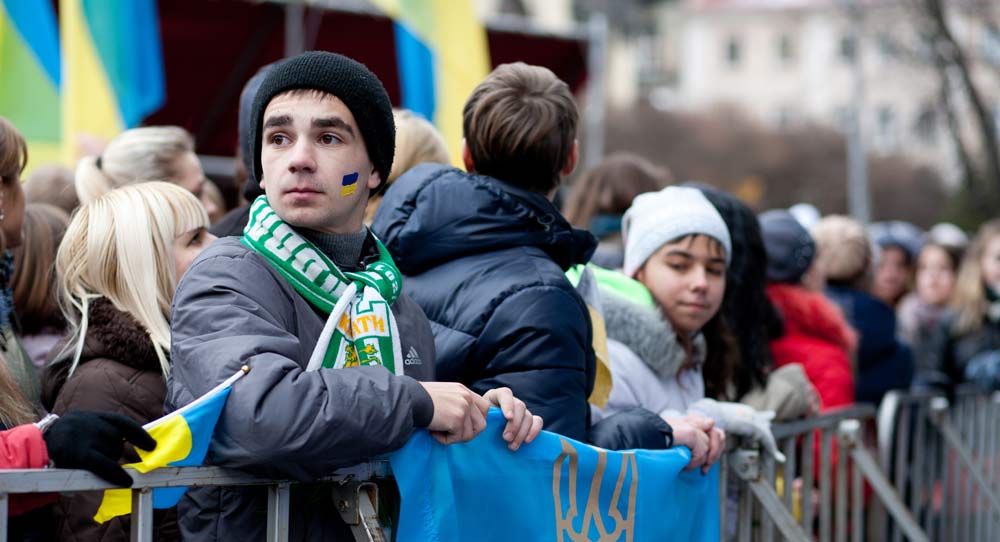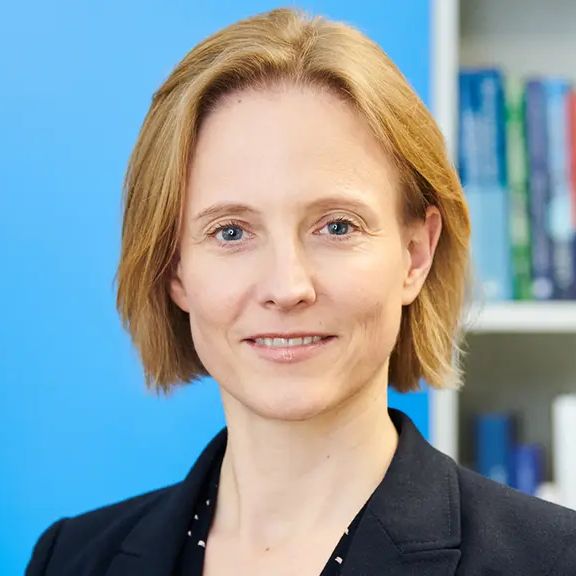Gwendolyn Sasse
{
"authors": [
"Gwendolyn Sasse"
],
"type": "commentary",
"blog": "Strategic Europe",
"centerAffiliationAll": "",
"centers": [
"Carnegie Endowment for International Peace",
"Carnegie Europe"
],
"collections": [
"Europe’s Eastern Neighborhood"
],
"englishNewsletterAll": "",
"nonEnglishNewsletterAll": "",
"primaryCenter": "Carnegie Europe",
"programAffiliation": "",
"programs": [],
"projects": [],
"regions": [
"Europe",
"Eastern Europe",
"Ukraine"
],
"topics": [
"Democracy",
"Political Reform",
"EU"
]
}
Source: Getty
Ukraine’s Youth: Politically Disinterested and Low Trust in the EU
The political apathy of Ukraine’s youth should come as a warning, especially at a moment when those in government are putting personal interests ahead of the country’s reform agenda.
The Ukrainian reform process is in a precarious balance, particularly in the field of anticorruption. President Petro Poroshenko calls himself the driver of reform. But he is now widely seen as the person slowing the reform process and actively positioning himself to ensure his influence over the 2019 presidential and parliamentary elections, most recently through an attempt to manage the appointments at the Central Electoral Commission.
Trust in Ukrainian politicians is generally low. Poroshenko’s approval rates have only been in the low double digits for a while. These figures still make him the most popular politician—or one of the two most “popular” politicians: a recent poll put his rival and long-time presidential contender Yulia Tymoshenko slightly ahead in terms of their electoral chances.Since October 2017 there has been a series of small protests in Kiev. There is something bubbling up in Ukrainian society again, but so far the signs are not pointing to a new “Maidan.” Some of the protests have galvanized around controversial former Georgian president and Odessa governor Mikheil Saakashvili, who is trying to lead a campaign against Poroshenko. While Saakashvili does not stand a real chance in the presidential elections, it is still unclear if some of the prominent opposition forces involved in the organization of his protests actually support him or aim to utilize him for their own purposes.
Critical moments in a country’s political development are shaped by the extent to which societal cohesion exists or can be forged by activists. In this context, we tend to know too little about the attitudes and preferences of the young(er) generation across Eastern Europe. Interesting new data on Ukraine’s “Generation Z” has just been released: the Friedrich-Ebert-Stiftung and the New Europe Center, in cooperation with GfK Ukraine, implemented a representative poll across Ukraine (except for Crimea and the parts of the Donbas currently not under Kiev’s control) in July and August 2017. The sample included 2000 respondents aged between fourteen and twenty-nine.
According to this survey, a clear majority of the respondents is neither interested in politics in general (around 65 percent are “not interested at all” or “rather disinterested”) nor in Ukrainian national or regional politics in particular (about 60 percent are “not interested at all” or “rather disinterested”). Political apathy among the young is not specific to Ukraine. However, at a key moment in a country’s reform trajectory the scope for disillusionment to have political repercussions is greater; for example, with regard to the consolidation of an anti-reform regime. Only 3 percent of the respondents indicated that they have participated in a demonstration, in a civil society or voluntary organization, or in online political activities.
A representative youth survey (2000 respondents aged fourteen to thirty-four) commissioned by the Ukrainian Ministry for Youth and Sport in 2017 established a similar degree of disinterest in politics. Probing the underlying reasons, it found that by far the most important reasons for apathy were a lack of trust in politicians (48 percent), a feeling of not having any influence (30 percent), and a sense of not understanding politics (24 percent).
The “Generation Z” survey revealed the most trusted institutions to be churches, volunteer organizations, the army, the media, and the police. Here, youth does not diverge significantly from the population at large, as other polls have shown. The policy priorities of the younger generation are also in line with those of the overall population, with the fight against crime and corruption, economic growth, and the reduction of unemployment topping the list.
The young generation is characterized by a conservative family image and little tolerance of homosexuality (44 percent say that homosexuality “can never be justified”). By comparison, only a third of the respondents say that accepting or giving a bribe is never justifiable. However, this question reveals big regional discrepancies: while 50 percent in the north are critical of bribes (the survey highlights the north, comprised of Zhytomyr, Kiev, Sumy, and Chernihiv oblasts as a noteworthy new region in Ukraine’s political makeup); in Kiev and the east this view is only shared by 19 and 15 percent respectively.
Overall, 60 percent of young respondents think that Ukraine should join the EU (with support in the south and east being somewhat lower, with 42 and 33 percent respectively). Most importantly, however, only a third of the young trusts the EU, with roughly another third distrusting the EU, and a third neither trusting nor distrusting the EU.
Every third young Ukrainian would like to see Ukraine in NATO, compared to 19 percent objecting to this idea, 21 percent being neutral, and 22 percent feeling unable to answer this question. Here, the regional polarization is wider, with only 13 and 22 percent in the east and south respectively supporting NATO membership.
The attitudes of Ukraine’s young (in particular their disinterest in politics and lack of engagement, linked to high levels of distrust in Ukrainian politics), should come as a warning to all reform-oriented forces in Ukraine—even more so at a moment when those in government are putting their personal interests ahead of the reform agenda. The lesson for the EU is to engage more seriously with the young in Ukraine to (re)build trust.
Gwendolyn Sasse is a nonresident senior fellow at Carnegie Europe and director of the Centre for East European and International Studies (ZOiS), Berlin.
About the Author

Nonresident Senior Fellow, Carnegie Europe
Sasse is a nonresident senior fellow at Carnegie Europe. Her research focuses on Eastern Europe, with a particular focus on Ukrainian politics and society, EU enlargement, and comparative democratization.
- Ukraine: Between a Rock and a Hard PlaceCommentary
- The Power of Language on War and PeaceCommentary
Gwendolyn Sasse
Recent Work
Carnegie does not take institutional positions on public policy issues; the views represented herein are those of the author(s) and do not necessarily reflect the views of Carnegie, its staff, or its trustees.
More Work from Strategic Europe
- Europe on Iran: Gone with the WindCommentary
Europe’s reaction to the war in Iran has been disunited and meek, a far cry from its previously leading role in diplomacy with Tehran. To avoid being condemned to the sidelines while escalation continues, Brussels needs to stand up for international law.
Pierre Vimont
- Taking the Pulse: Can European Defense Survive the Death of FCAS?Commentary
France and Germany’s failure to agree on the Future Combat Air System (FCAS) raises questions about European defense. Amid industrial rivalries and competing strategic cultures, what does the future of European military industrial projects look like?
Rym Momtaz, ed.
- Macron Makes France a Great Middle PowerCommentary
France has stopped clinging to notions of being a great power and is embracing the middle power moment. But Emmanuel Macron has his work cut out if he is to secure his country’s global standing before his term in office ends.
Rym Momtaz
- How Europe Can Survive the AI Labor TransitionCommentary
Integrating AI into the workplace will increase job insecurity, fundamentally reshaping labor markets. To anticipate and manage this transition, the EU must build public trust, provide training infrastructures, and establish social protections.
Amanda Coakley
- Can Europe Still Matter in Syria?Commentary
Europe’s interests in Syria extend beyond migration management, yet the EU trails behind other players in the country’s post-Assad reconstruction. To boost its influence in Damascus, the union must upgrade its commitment to ensuring regional stability.
Bianka Speidl, Hanga Horváth-Sántha










